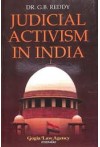- Author(s): Dr. G.B. Reddy
- Publisher: Gogia Law Agency / Publication
- Edition: 2 Ed Rp 2023
- Approx. Pages 632 + Contents
- Format Hardbound
- Approx. Product Size 21 x 14 cms
- Delivery Time 3-5 working days (within Kerala & South India) (Others 7-9 days)
- Shipping Charge Extra (see Shopping Cart)
......................................................................................................................................
Description
The Supreme Court of India is the most revered, the most adulated and probably the least studied of the Indian judicial bodies. The Indian judiciary led by the Supreme Court of India, has played a pivotal role in the lives of Indians from January 1950 till to date. The influence of this great institution is felt in sphere of human life. It there is any institution of the state that commands the utmost respect of the people, it is undoubtedly the judiciary, particularly the higher judiciary led by the Supreme Court. Over a period of well over half a century, the judiciary has established that it is responsible equally and on par with the other organs of the State, for securing the fourfold objective of securing to the Indian Citizens Justice, Equality, Liberty and Fraternity. It has become possible partly due to the Constitutional scheme and partly due to the willingness of the institution to participate in the social engineering.
A look at the judicial behaviour in India in the last about five decades, shows that the higher judiciary has gone through many an oscillation in its approach and conduct, depending on factors like the constitution of the courts and the strengths and weaknesses of the political organs of the State. The Supreme Court of India is said to have become the Supreme Court for Indians only during the period of 1980s and thereafter. It is primarily due to the judicial activism exhibited by the court now and then before 1980s and consistently after the 1980s. Many a time, the court has changed its attitude and adapted the law and Constitution to suit India's changing needs. These developments prompted this author to undertake the study of 'Judicial Activism of Supreme Court' after 1980s and its contribution for the development of constitutional in certain specific areas of Constitutional law. The title 'Judicial Activism in India' has been finalized as the author felt that the bulwark of judicial activism has emanated only from the Supreme Court of India.
......................................................................................................................................
Table of Contents
Chapter 1. Introduction
Chapter 2. Role of the Judiciary under Modern Constitutions
Chapter 3. Supreme Court and Judiciary under the Indian Constitution
Chapter 4. Judicial Activism Developments in India
Chapter 5. Expanding Horizons of Article 21 and the Role of Judicial Activism
Chapter 6. Access to Justice Contribution of Public Interest Litigation
Chapter 7. The Changing Equation between Directive Principles and Fundamental Rights Role of Judicial Activism
Chapter 8. Judicial Activism in India and Emerging Trends
Chapter 9. Conclusion
......................................................................................................................................
Author Details
Dr. G.B. Reddy is a lawyer
turned academician. He practiced in the High Court of Andhra Pradesh for
about seven years before joining the Faculty of Law Osmania University,
Hyderabad. He obtained his LL.B., LL.M. and Ph.D. degrees in law from
Osmania University, Hyderabad. His area of specialization is
Constitutional Law in LL.M. and Judicial Activism in Ph.D. He has
specialized knowledge in the area of Intellectual Property as an
independent researcher, research supervisor, publisher and teacher for
well over a decade. He also obtained P. G. Diploma in Human Rights from
University of Hyderabad. He has had a brilliant academic record with
three Gold Medals in LL.B. and one Gold Medal in LL.M.(Constitutional
Law) apart from being the first candidate to have qualified for UGC-JRF
in Law from Osmania University in 1993. He authored 18 well received
books on law including Women and Law, Intellectual Property Rights and
Law, Copyright Law in India, Consumer Protection and the Law Practical
Advocacy of Law and Right to Information and Law. He also edited two
books on Indian Constitution and Indian Judiciary. Two of his books
namely "Women and Law" and "Judicial Activism in India" (1st Ed)have
been reviewed favorably in the Book Review section of the Hindu by
eminent jurist and Justice V.R. Krishna lyer. Many of his books have
been prescribed as text books in various universities and other
educational institutions. He also published more than 50 research papers
on law published in standard National and International journals. He
has rich experience as an academic planner and administrator. He has
been a visiting faculty at several institutions of repute like A.P.
Judicial Academy, CCRT N AARM, A.P. Police Academy, National Police
Academy, Dr. MCRHRDI of A.P. & ICADR and several University Academic
Staff Colleges.

